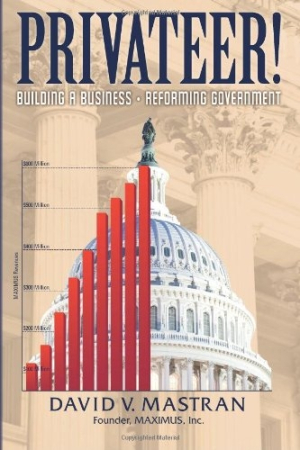Privateer!
Building a Business, Reforming Government
David Mastran admits that the connotation of “privateer” is not always positive—but he is proud of being a privateer as he defines it: “a person who privatizes government programs, replacing government employees with private-sector employees.” In fact, Mastran started MAXIMUS, a company that has become the largest social welfare privatization firm in the United States.
In this extremely well written, detailed account of Mastran’s days with MAXIMUS, the reader gets an insider’s view of the complexities associated with running a business whose business it is to make government run better. The author divides the book into seven parts: “Introduction and Overview,” “Building the Foundation,” “Core Competencies,” “Social Welfare Programs,” “Managing Rapid Growth,” “Complications,” and “Conclusions.” In each part, Mastran shares not just the anecdotal trials and tribulations of growing the business from the ground up, but also his unique perspective on privatizing major governmental programs, most of them classified as “entitlement” programs.
Early in the book, the reader learns about “the inherent inefficiency of government,” and how some government stakeholders regarded MAXIMUS as the enemy, despite the fact that the company’s mission was to improve the efficiency of government programs. Mastran demonstrates that the government procurement process during his tenure was “predominantly honest,” and that his company was able to win both state and federal contracts for consulting, system design, and, ultimately, outsourcing, or privatization. Mastran traces the growth of MAXIMUS, sharing numerous aspects of the business from a CEO’s perspective.
The author is refreshingly frank about some of the company’s most significant challenges, particularly in the section entitled “Complications.” Here, Mastran discusses the impact of lobbyists, politicians, and government employee unions. He shows by painful example the manner in which the media can put a sensationalist spin on a story. He describes how he had to “deal with disaster” and fight lawsuits along the way. He also offers a useful overview of the steps he took to take MAXIMUS public. Peppered throughout the book are Mastran’s experiential bits of wisdom that any business leader will find useful, including his overview of key growth strategies and his “Ten Principles for MAXIMUS Presidents” (the company had over twenty division and group presidents).
Privateer! should interest business executives and government officials for two reasons. First, it offers a business founder’s observations of what it takes to grow a business from $0 to over $600 million in revenue. Second, the book is particularly relevant in the context of the current political discussion surrounding Medicare and Social Security. Mastran makes a compelling case for privatizing such programs and writes that companies like MAXIMUS “demonstrate the freedom and flexibility the private sector has to innovate, adapt, and solve problems much more readily than the government.” Whether or not one agrees with Mastran’s vision of privatization, Privateer! makes for an engaging and intriguing read.
Reviewed by
Barry Silverstein
Disclosure: This article is not an endorsement, but a review. The publisher of this book provided free copies of the book and paid a small fee to have their book reviewed by a professional reviewer. Foreword Reviews and Clarion Reviews make no guarantee that the publisher will receive a positive review. Foreword Magazine, Inc. is disclosing this in accordance with the Federal Trade Commission’s 16 CFR, Part 255.

